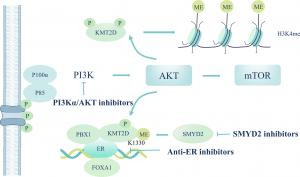
Unlocking the Future of Endocrine Disease Treatment: The Role of Epigenetics in Nuclear Receptor Regulation
SHANNON, CLARE, IRELAND, April 28, 2025 /EINPresswire.com/ -- This review highlights the critical role of epigenetic regulation in nuclear receptor function, shedding new light on its influence over endocrine-related diseases. It provides a comprehensive analysis of how DNA methylation, histone modifications, RNA-based mechanisms, and chromatin remodeling govern nuclear receptor activity, ultimately affecting metabolic and hormone-driven disorders such as diabetes, thyroid disease, and hormone-dependent cancers.
Endocrine disorders affect millions worldwide, with conditions like breast cancer, osteoporosis, and thyroid dysfunction presenting significant public health challenges. Nuclear receptors, a class of proteins that mediate hormonal signaling, rely on tightly controlled gene expression to function correctly. However, aberrant epigenetic changes can disrupt this balance, leading to disease progression.
One of the key mechanisms explored in this article is DNA methylation, a process in which methyl groups are added to DNA, potentially silencing critical genes. This phenomenon has been linked to breast cancer, where hypermethylation of the BRCA1 gene correlates with increased tumor risk. Similarly, in osteoporosis, altered methylation of genes like RANKL and osteoprotegerin impacts bone density regulation.
Another crucial regulatory process is histone modification, which involves chemical changes to histone proteins that control DNA accessibility. Histone acetylation, for instance, enhances gene transcription, while deacetylation suppresses it. Nuclear receptors interact with coactivators and corepressors, influencing gene expression through modifications like H3K9 methylation and H3K27 trimethylation—both of which play pivotal roles in hormone receptor-driven cancers and metabolic diseases.
Beyond direct DNA and histone modifications, non-coding RNAs such as microRNAs (miRNAs) regulate nuclear receptor function. These small RNA molecules act as gene silencers, affecting receptors like the estrogen receptor (ER) in breast cancer and the glucocorticoid receptor (GR) in stress-related metabolic disorders. Disruptions in these RNA pathways have been implicated in endocrine-related cancers and metabolic syndromes.
With these insights, the authors also highlight emerging therapeutic strategies targeting epigenetic mechanisms. Treatments such as epigenetic drugs, gene editing technologies, and histone deacetylase inhibitors (HDAC inhibitors) hold promise for restoring proper nuclear receptor function. These novel interventions could revolutionize treatment approaches for hormone-related diseases, moving towards precision medicine that tailors therapies to an individual's unique epigenetic profile.
As the field of epigenetics continues to advance, understanding the complex interactions between nuclear receptors and their regulatory mechanisms is crucial. This review underscores the potential for epigenetic therapies to transform treatment strategies, paving the way for breakthroughs in combating endocrine-related diseases and improving patient outcomes worldwide.
Funding Information:
National Natural Science Foundation of China 82170865
National Natural Science Foundation of China 82370856
National Natural Science Foundation of China 32101029
Natural Science Foundation of Shandong Province, China ZR2020QB164
Shandong Province Medical and Health Science and Technology Development Project of China 202203060805
Shandong Province Medical and Health Science and Technology Development Project of China 202203060917
Taishan Scholars Project of Shandong Province, China tsqn202211365
# # # # #
Genes & Diseases publishes rigorously peer-reviewed and high quality original articles and authoritative reviews that focus on the molecular bases of human diseases. Emphasis is placed on hypothesis-driven, mechanistic studies relevant to pathogenesis and/or experimental therapeutics of human diseases. The journal has worldwide authorship, and a broad scope in basic and translational biomedical research of molecular biology, molecular genetics, and cell biology, including but not limited to cell proliferation and apoptosis, signal transduction, stem cell biology, developmental biology, gene regulation and epigenetics, cancer biology, immunity and infection, neuroscience, disease-specific animal models, gene and cell-based therapies, and regenerative medicine.
Scopus CiteScore: 7.3
Impact Factor: 6.9
# # # # # #
More information: https://www.keaipublishing.com/en/journals/genes-and-diseases/
Editorial Board: https://www.keaipublishing.com/en/journals/genes-and-diseases/editorial-board/
All issues and articles in press are available online in ScienceDirect (https://www.sciencedirect.com/journal/genes-and-diseases ).
Submissions to Genes & Disease may be made using Editorial Manager (https://www.editorialmanager.com/gendis/default.aspx ).
Print ISSN: 2352-4820
eISSN: 2352-3042
CN: 50-1221/R
Contact Us: editor@genesndiseases.com
X (formerly Twitter): @GenesNDiseases (https://x.com/GenesNDiseases )
# # # # # #
Reference
Xiaodong Sun, Epigenetic regulation of nuclear receptors: Implications for endocrine-related diseases and therapeutic strategies, Genes & Diseases, Volume 12, issue 4, 2025, 101481, https://doi.org/10.1016/j.gendis.2024.101481
Genes & Diseases Editorial Office
Genes & Diseases
+86 23 6571 4691
editor@genesndiseases.com
Distribution channels:
Legal Disclaimer:
EIN Presswire provides this news content "as is" without warranty of any kind. We do not accept any responsibility or liability for the accuracy, content, images, videos, licenses, completeness, legality, or reliability of the information contained in this article. If you have any complaints or copyright issues related to this article, kindly contact the author above.
Submit your press release


